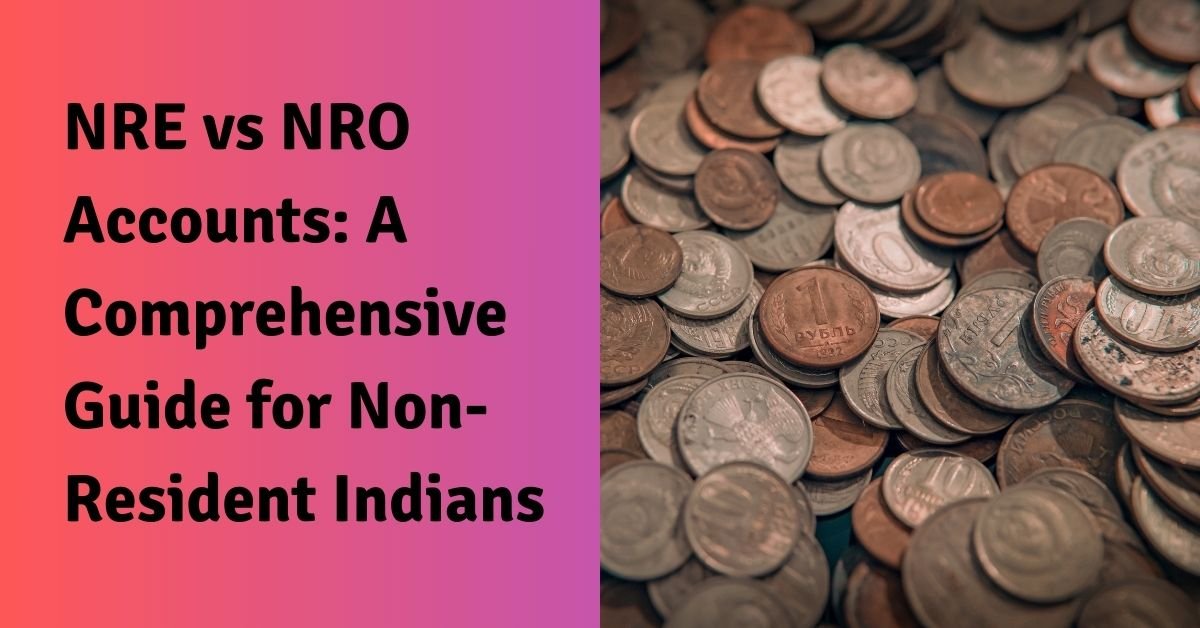For Non-Resident Indians (NRIs), managing finances across borders can be challenging. Two key banking tools that help simplify this process are Non-Resident External (NRE) and Non-Resident Ordinary (NRO) accounts. Though both are tailored for NRIs, they have distinct features and regulations. This guide will explore NRE and NRO accounts, helping you determine which suits your financial needs best.
What are NRE and NRO Accounts?
NRE Account:
An NRE account is opened by an NRI in India to transfer foreign earnings. It’s maintained in Indian Rupees (INR), with deposits in foreign currency converted to INR at the prevailing exchange rate.
NRO Account:
An NRO account is for managing income earned within India, such as rent, dividends, or pensions. It can be funded by both foreign earnings and Indian income.
Eligibility Criteria
| Criteria | NRE Account | NRO Account |
|---|---|---|
| NRIs | Yes | Yes |
| PIOs | Yes | Yes |
| OCIs | Yes | Yes |
| Foreign Nationals | No, except with special RBI approval | Yes, but with restrictions |
Foreign nationals who are not of Indian origin generally cannot open an NRE account. They can open an NRO account, but this requires specific approvals from the Reserve Bank of India (RBI) and may come with stringent conditions. Those who are not eligible to open either account include residents of India, even if they are of Indian origin and persons who do not have a valid NRI, PIO, or OCI status.
Account Currency
| Account Type | Currency |
|---|---|
| NRE | Indian Rupees (INR) |
| NRO | Indian Rupees (INR) |
Both accounts are held in INR, but the NRE account handles foreign currency conversions. While both NRE and NRO accounts are maintained in INR, the NRE account is specifically tailored for foreign earnings with the benefit of easy conversion and full repatriability, making it suitable for NRIs who want to remit their foreign income to India. The NRO account, on the other hand, is designed to manage income generated within India, with more stringent repatriation limits and tax implications.
Source of Funds
| Source of Funds | NRE Account | NRO Account |
|---|---|---|
| Foreign Earnings | Yes | Yes |
| Indian Income | No | Yes |
NRE accounts are for foreign-earned income, while NRO accounts handle both foreign and domestic income.
Repatriability of Funds
| Repatriability | NRE Account | NRO Account |
|---|---|---|
| Principal & Interest | Fully repatriable | Up to USD 1 million per year (subject to submission of relevant documents like a chartered accountant’s certificate and undertaking for repatriation) |
NRE accounts offer more flexibility in transferring money abroad. NRO account holders must adhere to certain conditions, including documentation and compliance with tax regulations, to repatriate up to USD 1 million per financial year.
Taxability of Interest
| Taxability | NRE Account | NRO Account |
|---|---|---|
| In India | Tax-free | Taxable (30% TDS plus applicable surcharge and cess) |
| TDS (Tax Deducted at Source) | No | Yes (30%) |
Interest earned on NRE accounts is exempt from income tax in India, making it attractive for NRIs looking to save on taxes. In contrast, interest on NRO accounts is subject to Tax Deducted at Source (TDS) at a rate of 30%, plus applicable surcharge and cess. This tax can significantly impact the net returns from the account, so NRIS need to consider this when choosing between the two.
Joint Account Holders
| Joint Account Holders | NRE Account | NRO Account |
|---|---|---|
| Other NRIs | Yes | Yes |
| Resident Indians | No | Yes |
NRO accounts offer more flexibility in terms of joint holders.
Types of Deposits
| Deposit Type | NRE Account | NRO Account |
|---|---|---|
| Savings | Yes | Yes |
| Current | Yes | Yes |
| Fixed | Yes | Yes |
| Recurring | Yes | Yes |
Both accounts provide similar deposit options.
Forex Risk
| Forex Risk | NRE Account | NRO Account |
|---|---|---|
| Foreign Exchange Fluctuations | High | Moderate |
For NRE accounts, high forex risk arises from converting foreign currency to INR and back, which can affect the value of funds due to exchange rate fluctuations. NRIs should be proactive in monitoring forex trends and use strategies like forward contracts to manage this risk.
In contrast, NRO accounts have moderate forex risk since they primarily manage INR income. While there is some risk in converting INR to foreign currency for repatriation, it is generally less than the forex risk associated with NRE accounts. NRIs should be aware of repatriation limits and tax obligations when managing their funds through an NRO account.
Internet Banking and Debit Cards
| Facility | NRE Account | NRO Account |
|---|---|---|
| Internet Banking | Yes | Yes |
| International Debit Card | Yes | No |
The differences in debit card usage can be significant for NRIs traveling between India and their country of residence.
Loans and Overdrafts
| Facility | NRE Account | NRO Account |
|---|---|---|
| Loans | Yes | Yes |
| Overdrafts | Yes | Yes |
Both accounts allow for loans and overdraft facilities.
Conversion to Resident Accounts
| Conversion Upon Return | NRE Account | NRO Account |
|---|---|---|
| Account Type | Resident Foreign Currency (RFC) | Regular Savings Account |
Understanding the conversion process is crucial for NRIs planning to return to India permanently. When an NRI returns to India for good, the NRE account can be converted to a Resident Foreign Currency (RFC) account, allowing the account holder to maintain their foreign currency earnings without having to convert them to INR. This helps in avoiding potential losses due to fluctuating exchange rates. NRO accounts, on the other hand, can be converted to regular savings accounts, making it easier to manage income and expenses in INR without the need for further conversions or compliance with NRI-specific regulations.
Purpose and Ideal Usage
| Scenario | Recommended Account Type | Reason |
|---|---|---|
| High foreign income, frequent transfers | NRE | Allows easy repatriation of foreign earnings with tax-free interest in India. |
| Income from Indian properties | NRO | Suitable for managing rent and other Indian income, despite taxable interest. |
| Joint account with resident Indian | NRO | Allows joint holding with resident family members, making it easier to manage shared expenses in India. |
| Investing in Indian securities | Both | Use NRE for foreign earnings to invest, NRO for domestic earnings, keeping tax implications and repatriation limits in mind. |
| Long-term stay in India | NRO | Simplifies managing local expenses and investments, while also enabling joint account holding with resident Indians. |
| Planning to return to India permanently | NRO | Easier to convert NRO accounts to regular savings accounts upon return, managing income and expenses within India seamlessly. |
Investment Options
| Investment Type | NRE Account | NRO Account |
|---|---|---|
| Stocks, Mutual Funds | Yes | Yes |
| Repatriable Proceeds | Yes | Limited to USD 1 million per year |
Both accounts offer investment opportunities, but repatriation rules differ.
Fund Transfer Capabilities
| Fund Transfer | NRE Account | NRO Account |
|---|---|---|
| To Same Account Type | Yes | Yes |
| To Different Account Type | Yes (to NRO) | Limited (to NRE) |
Transferring funds between different account types is an important consideration.
Exchange Rate Benefits
| Benefit | NRE Account | NRO Account |
|---|---|---|
| Better Exchange Rates | Yes | No |
NRIs transferring significant amounts of foreign currency may find NRE accounts more advantageous.
Nomination Facility
| Facility | NRE Account | NRO Account |
|---|---|---|
| Nominee (NRI/Resident Indian) | Yes | Yes |
Both accounts offer nomination facilities for security and ease of transfer.
Minimum Balance Requirements
| Minimum Balance | NRE Account | NRO Account |
|---|---|---|
| Higher than regular savings | Yes | Varies by bank |
NRIs should check with banks for specific minimum balance requirements.
Foreign Inward Remittance Certificate (FIRC)
| Facility | NRE Account | NRO Account |
|---|---|---|
| FIRC Issuance | Yes | Yes (for foreign deposits) |
FIRCs are important for tax and regulatory purposes.
Impact on FATCA Reporting
| FATCA Reporting | NRE Account | NRO Account |
|---|---|---|
| For U.S. Persons | Yes | Yes |
U.S. citizens or Green Card holders need to be aware of FATCA reporting obligations.
Ease of Maintaining Non-Resident Status
| Maintenance | NRE Account | NRO Account |
|---|---|---|
| Easier | Yes | No |
NRE accounts are simpler to manage for maintaining non-resident status.
Conclusion
Choosing between NRE and NRO accounts is crucial for managing your finances effectively as an NRI. NRE accounts are ideal for those who primarily earn abroad and want the flexibility to repatriate funds easily, while NRO accounts are best suited for managing income earned within India. Each account type comes with unique features, benefits, and risks that can impact your financial strategy.
Opt for an NRE Account if:
- Your primary source of deposits is foreign earnings.
- You desire easy and full repatriation of funds.
- You seek tax-free interest income in India.
- You aim to benefit from favorable exchange rates for converting foreign currency to INR.
- You need a straightforward account conversion process if planning to return to India permanently.
Opt for an NRO Account if:
- You have income sources within India.
- You wish to hold a joint account with a resident Indian.
- You require an account to manage Indian expenses and investments.
- You anticipate a longer-term stay in India, making local income management easier.
- You plan to convert the account to a regular savings account upon your permanent return to India.
Top Banks for NRE and NRO Accounts
| Rank | Bank Name | NRE Account Features | NRO Account Features |
|---|---|---|---|
| 1 | Axis Bank | High interest rates, easy online banking, international debit card | Comprehensive NRI services, easy repatriation, online account management |
| 2 | RBL Bank | Competitive interest rates, 24/7 customer support, global access | Competitive interest rates, global access, effective customer service |
| 3 | Yes Bank | Attractive interest rates, online banking, wide branch network | Good repatriation services, easy account management, tax support |
| 4 | Kotak Mahindra Bank | High interest rates, easy account setup, comprehensive NRI services | Convenient for managing domestic income, online banking features |
| 5 | DBS Bank | High interest rates, global banking services, user-friendly app | Good interest rates, user-friendly online services, effective customer support |
| 6 | HDFC Bank | High interest rates, advanced online banking, global ATM access | Efficient repatriation process, comprehensive NRI services |
| 7 | ICICI Bank | Competitive interest rates, multi-currency options, international services | Effective repatriation services, online account management |
| 8 | Bank of Baroda | High interest rates, global access, easy online account management | Convenient repatriation services, online banking options |
| 9 | State Bank of India (SBI) | No minimum balance requirement, extensive branch and ATM network | Reliable for managing domestic income, strong branch and ATM network |
| 10 | Citibank | High interest rates, global banking services, excellent customer support | Comprehensive services for NRO accounts, efficient online banking |
When deciding between NRE and NRO accounts, several key factors should guide your choice. Interest rates are a significant consideration, as different banks offer varying rates for both NRE and NRO accounts. It’s essential to compare these rates to ensure you get the best return on your deposits. Additionally, minimum balance requirements can vary among banks, so review these requirements to avoid any potential fees. Speaking of fees, it’s important to be aware of account opening fees, annual maintenance charges, and transaction fees associated with each account type, as these can impact your overall account costs. Consider the online banking features and mobile banking apps offered by the banks, especially if you prefer managing your finances remotely. Another crucial aspect is the branch network; if you visit India frequently, choosing a bank with a large branch network can be beneficial for convenient access to services. Lastly, customer service is important—look for a bank that provides excellent support both online and offline. To ensure that you make the best decision for your financial needs and goals, it is highly recommended that you consult with a financial advisor. A professional can offer personalized advice, help you navigate forex risks, tax implications, and repatriation rules, and assist you in optimizing your financial management strategies. Don’t hesitate to seek expert guidance to align your financial decisions with your long-term objectives and regulatory requirements.
Frequently Asked Questions (FAQs)
1. Can NRIs hold both NRE and NRO accounts simultaneously?
Ans – Yes, NRIs can hold both NRE and NRO accounts simultaneously to manage their foreign and Indian income separately.
2. Are the funds in NRE accounts taxable in India?
Ans – No, both the principal and interest earned in NRE accounts are tax-free in India.
3. Can I transfer funds from my NRO account to my NRE account?
Ans – Yes, but there are restrictions. NRIs can transfer funds from NRO to NRE accounts up to USD 1 million per financial year, subject to payment of applicable taxes and submission of necessary documentation.
4. Is the interest earned on NRO accounts taxable?
Ans – Yes, interest earned on NRO accounts is subject to Tax Deducted at Source (TDS) at a rate of 30%, plus applicable surcharge and cess.
5. Can resident Indians be joint account holders in NRE and NRO accounts?
Ans – Resident Indians can only be joint account holders in NRO accounts, not in NRE accounts. NRE accounts can only have NRIs as joint account holders.
6. What happens to my NRE and NRO accounts if I return to India permanently?
Ans – If you return to India permanently, your NRE account can be converted to a Resident Foreign Currency (RFC) account, while your NRO account can be converted to a regular savings account.
7. Are there any restrictions on the repatriation of funds from NRE accounts?
Ans – No, funds (both principal and interest) in NRE accounts are fully repatriable without any restrictions.
8. Can I open an NRE or NRO account from abroad?
Ans – Yes, many Indian banks offer the facility to open NRE and NRO accounts online from abroad. Required documents can be submitted electronically or via courier.
9. What is the Foreign Inward Remittance Certificate (FIRC)?
Ans – An FIRC is a document issued by banks in India as proof of receipt of foreign currency remitted into an Indian account. It is essential for regulatory and tax purposes.
10. Do NRE and NRO accounts offer Internet banking and international debit cards?
Ans – Both NRE and NRO accounts offer internet banking facilities. NRE accounts generally provide international debit cards, while NRO accounts typically offer domestic debit cards.
11. What are the minimum balance requirements for NRE and NRO accounts?
Ans – Minimum balance requirements vary by bank, but NRE accounts usually require a higher minimum balance compared to NRO accounts.
12. Can funds from an NRE account be used to invest in Indian stocks and mutual funds?
Ans – Yes, funds from NRE accounts can be used to invest in Indian stocks and mutual funds. Both NRE and NRO accounts offer investment options, though repatriation rules differ.
13. Are there any forex risks associated with NRE accounts?
Ans – Yes, NRE accounts are subject to forex risks due to fluctuations in foreign exchange rates. NRIS needs to consider these risks, especially if they plan to repatriate funds.
14. Can NRO account holders repatriate funds abroad?
Ans – Yes, NRO account holders can repatriate up to USD 1 million per financial year, subject to applicable taxes and submission of relevant documents.
15. What are the documentation requirements for opening NRE and NRO accounts?
Ans – Typically, NRIs need to provide proof of NRI status, passport, visa, address proof, and a photograph to open NRE and NRO accounts. Specific requirements may vary by bank.





